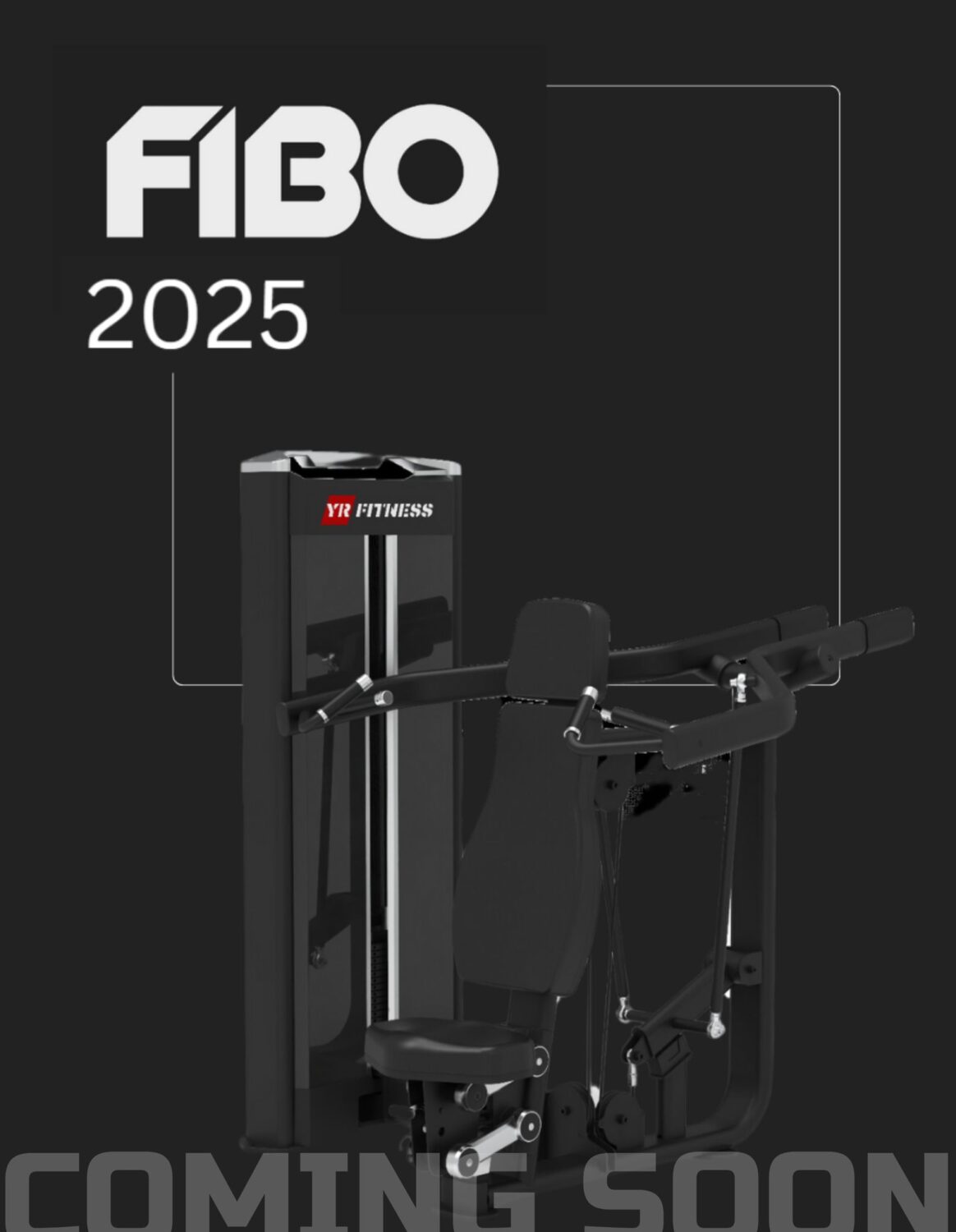Your Best Commercial Gym Flooring Tiles Manufacturer In China
- Manufacture gym accessories that are guaranteed for long-term usage
- With cost-effective commercial quality gym accessories
- Gym accessories can withstand long abusive years of usage
- Non-Skid textured and shock-absorbing
- Provides comfortable cushioned workout space
- Dense and durable foam to protect floors
- Protects the floor and accessories against scratches and dents during workout
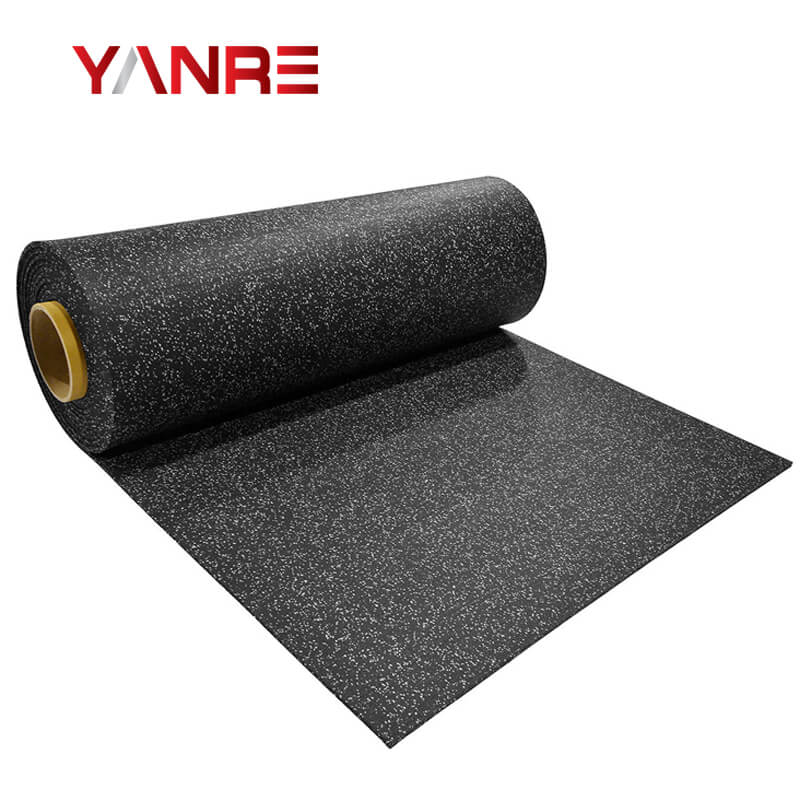
Products We Have for You
Showing all 4 results
-
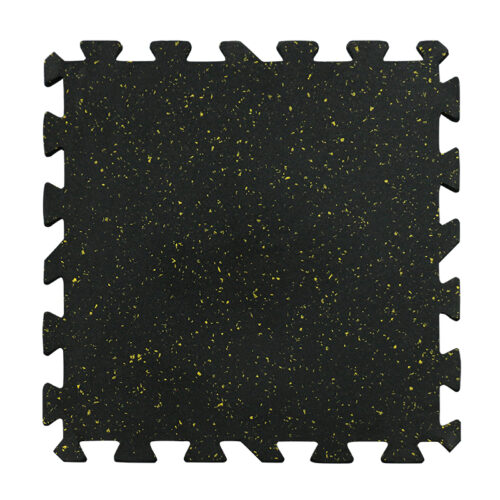
Gym Floor — GMRB Series
$5.00Gym Floor easily transforms hard floors into a pleasant, impact-absorbing workout s...
-
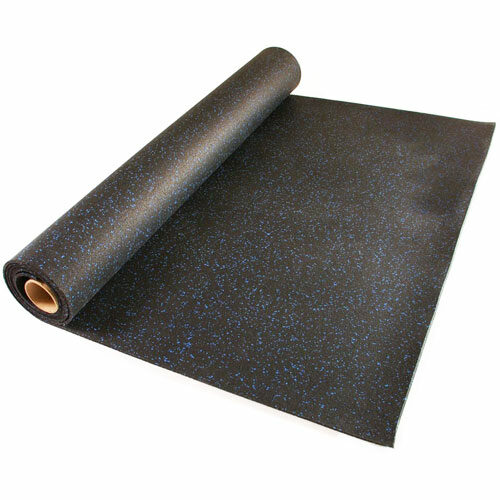
Gym Floor—GMR Series
$5.00This Gym Flooring Rolls is made from premium quality materials that protect surface...
-
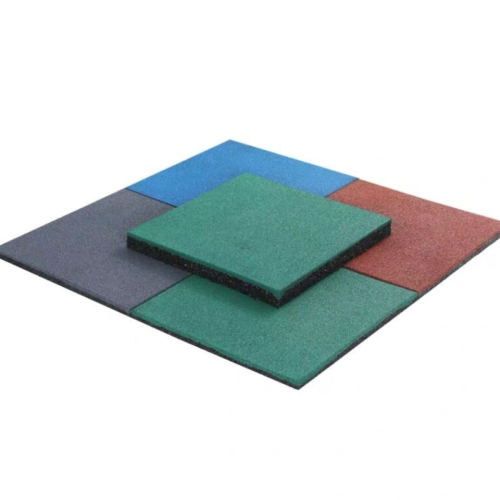
Gym Floor—GMB Series
$5.00Gym Floor is an innovative accessory designed to improve efficiency and safety duri...
-
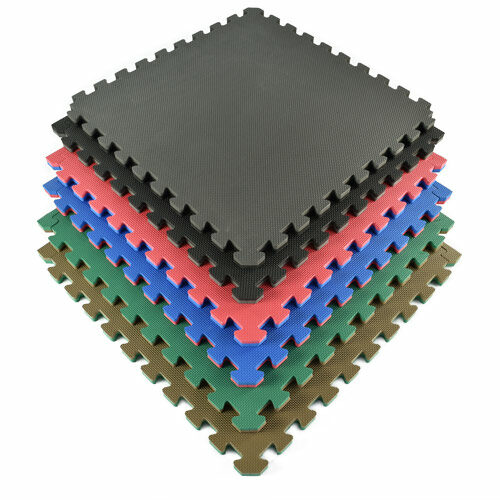
Gym Floor
$5.00Gym Floor is a non-skid textured foam padding that can be used in the commercial gy...

Factory
Over 95% clients choose to cooperate with Yanre Fitness, after visiting our factory and trying our commercial gym equipment personally.
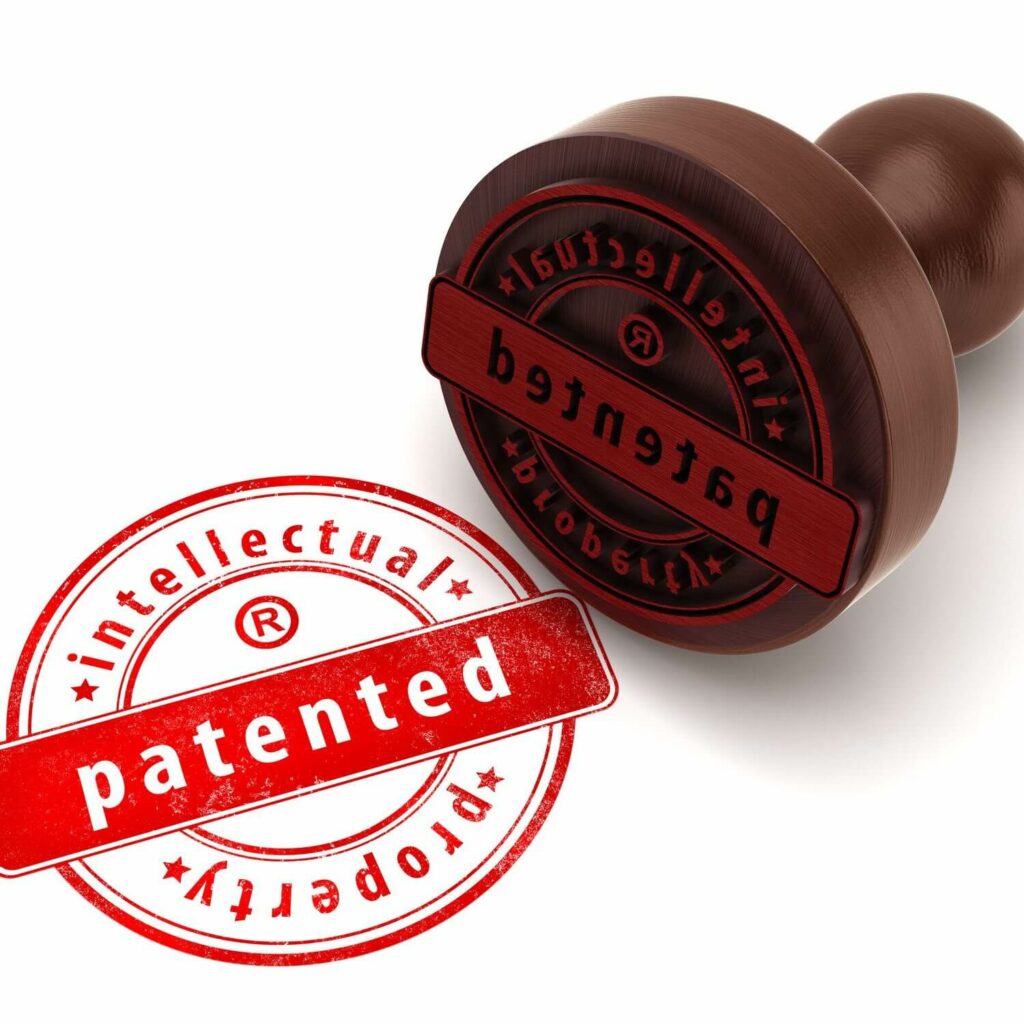
Patents
Our gym equipment meet ISO 20957 standard, with over 40 patents (Utility Model Patents & Appearance Design Patents)
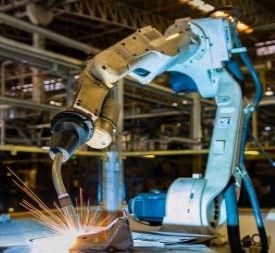
R&D Invest
For more than 20 years, Yanre Fitness invested over 8 million USD for technology development.
Commercial Gym Flooring Tiles – Definitive FAQ Guide
Gym flooring is not just designed for aesthetics but also to protect your gym users. So, quality and affordability are the main factors in choosing a commercial gym flooring.
To give you information on where and how to buy quality commercial gym flooring tiles is this FAQ guide’s goal. So, let’s get right on it. Shall we?
Table of Contents
- What is a commercial gym flooring tile?
- What are my options for commercial gym flooring tiles?
- Which type of commercial gym flooring tile is best for my gym?
- How thick should a commercial gym flooring be?
- How much does a commercial gym flooring cost?
- What is the usual size of commercial gym flooring?
- How is a commercial gym flooring tile different from flooring rolls?
- Are commercial gym flooring tiles different from mats?
- Are commercial gym flooring tiles better than mats?
- Are waterproof commercial gym flooring tiles recommended?
- Do I need an installer for commercial gym flooring tiles?
- Should I use adhesives for installing commercial gym flooring tiles?
- Do I need an underlay for commercial gym flooring tiles?
- Can commercial gym flooring tiles help in soundproofing?
- What does temperature do in commercial gym flooring tiles?
- Can I only have commercial gym flooring tiles on parts of my space?
- Can I choose the colors for my commercial gym flooring tiles?
- Can my gym’s logo be printed on the commercial gym flooring tiles?
- What should I consider when purchasing the right commercial gym flooring tiles?
- How are commercial gym flooring tiles maintained?
- When should I replace the commercial gym flooring tiles?
- Conclusion
What is a commercial gym flooring tile?
A commercial gym flooring tiles are flexible matting usually made of rubber. They are attached like square jigsaw puzzles and can fit in almost any size and space configuration.
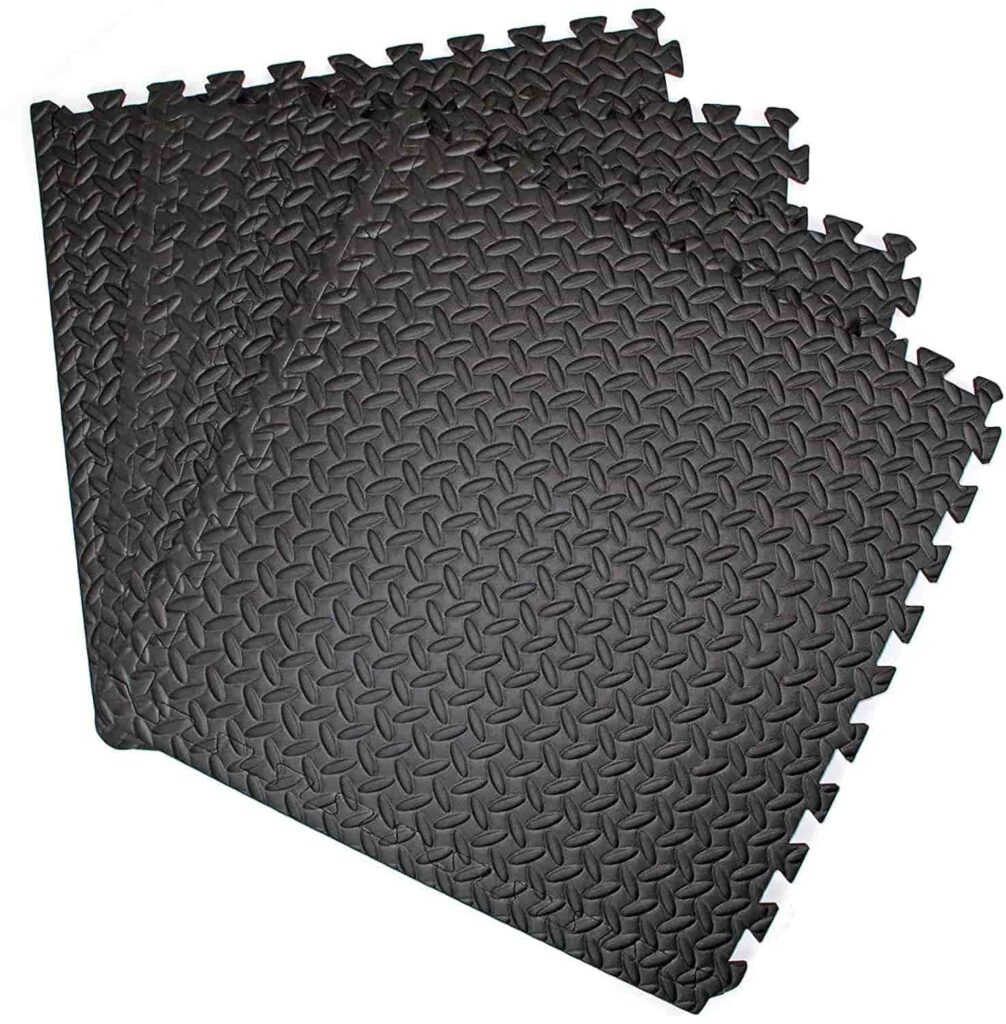
Figure 1. Commercial gym flooring tiles
Commercial gym flooring tiles are used for concrete floor protection, shock absorption, traction, and protection of your users.
What are my options for commercial gym flooring tiles?
You can choose from 7 different types of gym flooring tiles.
EVA Foam Flooring
EVA foam flooring is best for spaces in your gym that don’t hold heavy weights. This foam flooring is cheap, easy to install, and is the most comfortable among all flooring tiles.
However, they are prone to scratches, are slippery when wet, and will not last long.

Figure 2. Foam flooring tiles
Wood Flooring
For gyms that offer dance exercises, yoga, kickboxing, or other group programs, would flooring is the best option. They are quite stylish looking but carry many disadvantages.

Figure 3. Wooden flooring tiles
Wood flooring is quite expensive, they don’t absorb shock well. They get damaged easily when not used properly. Shards can come off which can harm your users in the gym.
PVC Flooring
PVC tiles are suitable for all types of gyms and are known to be very durable. They can be installed fast and are easily cleaned. They are also available in a variety of colors and designs.

Figure 4: Vinyl flooring
However, PVC tiles are not a good shock absorber, expensive, and are easily damaged.
Turf (Synthetic Grass) Flooring
Turf tiles are made of PP or PE plastics. They are quite pleasing to the eyes, can absorb shock adequately, and are durable. But this type of flooring can be costly, needs a qualified installer, and doesn’t offer sub-floor protection.

Figure 5. Turf flooring
Rubber Flooring
Just like PVC, rubber tiles are suitable for all kinds of gyms. They are usually made of natural rubber trees or recycled rubber. Rubber flooring is quite more affordable than other types of flooring. They are also durable, easy to install, have a good shock-absorbing ability, and can resist damage.

Figure 6. Rubber flooring
But your space can get a rubber smell if rubber flooring is newly installed. Another downside is, they don’t provide good insulation for your space.
Carpet Flooring
Carpet flooring is good for your reception area at the gym and spaces where there will not be weights. They are usually made of nylon, polyester, or wool fibers.

Figure 7: Carpet flooring
Carpets can absorb shock quite well and are affordable. But they need to be replaced after a year or two.
They absorb moisture and as such will give off a pungent smell and can also be a cause for various skin infections. They also don’t protect your concrete floor beneath.
Cork Flooring
Made of tree barks, cork flooring is eco-friendly, affordable, and provides good protection for your floor and users. That’s why they are suitable for medium-sized gyms. However, just like any organic material, they don’t last long and can get damaged quite easily.

Figure 8: Cork flooring tiles
Which type of commercial gym flooring tile is best for my gym?
We recommend rubber flooring tiles. They are very sturdy, very affordable, and can be manufactured in any shape and size you want.

Figure 9. Rubber flooring tiles for commercial gyms
Yanre Fitness has an array of commercial gym rubber tiles that can suit your taste and offer your gym long-lasting protection.
How thick should a commercial gym flooring be?
For general use, you can buy 3/8-inch-thick flooring.

Figure 10. The thickness of commercial gym flooring tiles
Commercial gym flooring is 1/4 to 1/2 inches thick depending on the environment in which it is installed. For weight rooms in your gym, it is recommended you use ½ in flooring tiles. That’s because your floor will be subjected to high impacts when weights are accidentally or intentionally dropped on the floor.
How much does a commercial gym flooring cost?
Commercial gym flooring can range from $2 to $20 per square foot. It will depend on the type and quality of gym flooring tiles you’ll get.
For the most part, rubber flooring is the cheapest and most durable of all.
What is the usual size of commercial gym flooring?
They are usually in 2’ x 2’ sizes. You can ask for a customized one too.

Figure 11. Size of a commercial gym flooring tile
How is a commercial gym flooring tile different from flooring rolls?
Flooring tiles are sold in smaller sizes while flooring rolls are the carpet flooring you see in offices.
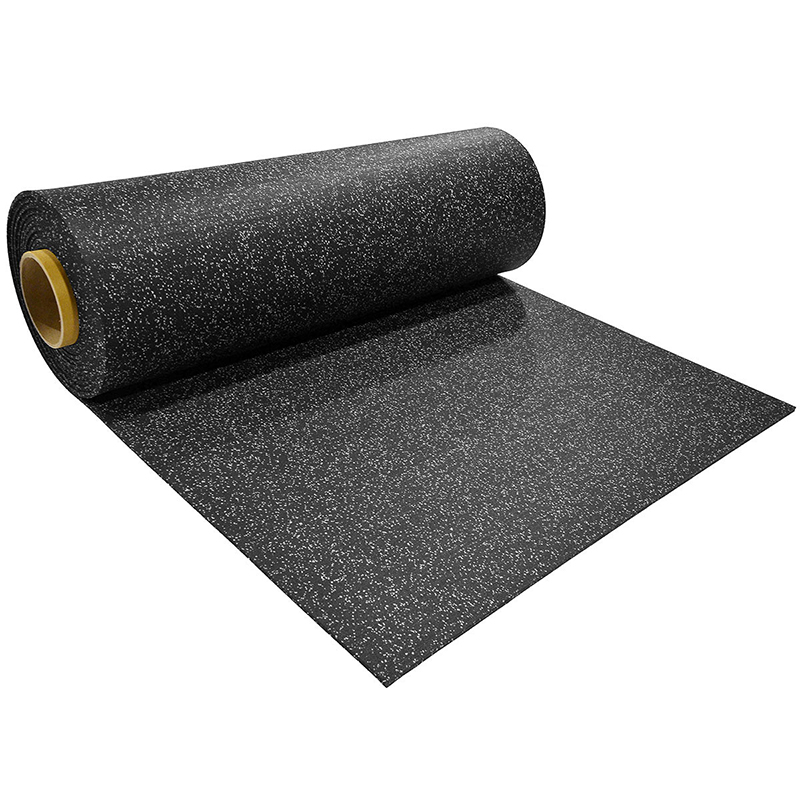
Figure 12. Commercial gym flooring rolls
Floor tiles are easy to install, store, and don’t require any adhesives. They can also fit into small spaces. However, they can be costly and needs a lot of installation time.
Are commercial gym flooring tiles different from mats?
Yes, gym flooring tiles are like square jigsaw puzzles but mats are just flooring rolls cut into squares. Edges of tiles can get damaged easily. In the case of mats, they need adhesives for installation, and edges can get curled up quite easily.

Figure 13. Commercial gym flooring mats
Are commercial gym flooring tiles better than mats?
Not necessarily, mats and tiles do have their suitability depending on the space of your gym.
For large spaces where there is frequent foot traffic and less free weights, mats or rolls are recommended. But for small areas and areas with an irregular shape, it’s best to use flooring tiles.
With Yanre Fitness, we have all kinds of commercial gym flooring tiles and mats you need for your gym. Just contact us and we will help you with your gym flooring needs!
Are waterproof commercial gym flooring tiles recommended?
Of course, you should always find waterproof flooring tiles for your gym.
Moisture is the greatest enemy of floor finishes. Your floor tiles will deteriorate prematurely and later give off a bad smell and become a cause for skin infections.
Do I need an installer for commercial gym flooring tiles?
It depends on the type of tile and the amount of time you have.
For rubber tiles, they can be easily installed by a non-professional like you and your staff. But for vinyl and turf tiles, you need a qualified installer to do the job.
Likewise, smaller spaces for rubber tiles are a do-it-yourself work. But for larger areas, you might need others for that.
Should I use adhesives for installing commercial gym flooring tiles?
It’s better to use adhesives when installing flooring tiles but it’s not a requirement.
Floor tiles though with meshed edges can still come off after some time. So, it is recommended to use adhesives to keep it in place for a long time.
Do I need an underlay for commercial gym flooring tiles?
Underlays are optional but they can help in the durability of your gym floor tiles. Underlays give protection to your concrete floor, increase the shock and noise absorption ability of the floor tiles and their durability.

Figure 14. Underlay for commercial gym flooring tiles
But be sure that the underlay you purchase is compatible with your floor tiles.
Can commercial gym flooring tiles help in soundproofing?
Soundproofing capabilities will depend on the type of tile you’d want to install. Rubber tiles are the best for noise reduction.
Generally, the thicker the rubber tile is the more soundproofing qualities it has. And adding an underlay will boost the soundproofing of your rubber tiles.
What does temperature do in commercial gym flooring tiles?
Rubber tiles will swell or tighten depending on the temperature of your gym space.
To prevent your tiles from being damaged because of this, just let them expand under room temperature without fixing them with glue. Then put adhesive after three days.
You can also space the tiles 1/8 in from each other so that each tile has room for expanding and contracting.
Can I only have commercial gym flooring tiles on parts of my space?
It’s your preference but we recommend covering your whole space with tiles. Gym tiles not only protect your floor but also cushions your users from tripping accidents and maintain proper hygiene in your gym.
Can I choose the colors for my commercial gym flooring tiles?
Of course, rubber tiles can be dyed with almost any color in the color wheel. Yanre Fitness has a variety of colors and styles for your gym needs.

Figure 15: Commercial gym flooring tiles in a variety of colors
If you ever need to customize your gym tiles, feel free to call Yanre Fitness so we can accommodate your request.
Can my gym’s logo be printed on the commercial gym flooring tiles?
Yes, we can do that for you. Just contact us and give your specifications on the logo you want to imprint on the flooring tiles.
What should I consider when purchasing the right commercial gym flooring tiles?
Here are your considerations when deciding on the commercial gym flooring tiles you need.
- Budget
- Area for covering.
- Equipment to be stationed in that area.
- Exercises designated in that area.
- Area of coverage.
- Frequency of replacement
- Should complement the space and ambiance of your gym
For distribution centers, it’s better to have some for every customer you will have. So make sure you have variety in the tiles your purchase.
How are commercial gym flooring tiles maintained?
The user manual that comes with the tiles will give you specific instructions on the dos and don’ts for your tiles.
In general, just always keep it clean and don’t let moisture and harsh chemicals come in contact with it.
When should I replace the commercial gym flooring tiles?
You can enjoy your floor tiles from 8 to 10 years. After that, we urge you to replace them.
In 8 years, your tile will get thinner due to wear and their and high impacts it has been subjected to. Plus, it can be hazardous to the health of your users if it stays longer than 10 years in your gym.
Conclusion
We hope we have answered all your questions regarding the commercial gym flooring tiles. If you have any more queries, just pick up the phone and dial Yanre Fitness’ number.
Yanre Fitness can offer you premium quality commercial gym flooring tiles at the most competitive prices. We can even customize your tiles at your request. So give us a call and we will be happy to serve your needs for commercial gym flooring.
Recommended Reading: The Ultimate Gym Flooring Buying Guide for Gym Owner’s


